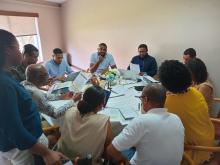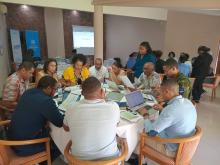WHO strengthens support for the health response in São Vicente following floods
The World Health Organization (WHO) in Cabo Verde has strengthened its presence and technical support on the island of São Vicente following the severe floods that affected several communities, including the locality of Salamansa, where three children tragically lost their lives. The visit to the local health post marked a moment of active listening, technical assessment, and strategic guidance to mitigate post-disaster health risks.
During the visit, the multidisciplinary team—comprising members of the National Directorate of Health, the São Vicente Health Delegation, and professionals from the National Institute of Public Health (INSP)—was received by the nurse in charge of the Salamansa health post, who provided a detailed update on the interventions already carried out in the community. The professional highlighted the challenges faced after the heavy rains, including increased vulnerability to waterborne and vector-borne diseases such as acute diarrhea and dengue.
WHO, in coordination with local health authorities, provided practical and technical guidance on outbreak prevention and control measures, with special attention to the health risks that worsen after flood events. Key recommendations included community awareness campaigns, strengthening epidemiological surveillance, improving sanitation conditions, and ensuring safe water management.
WHO’s actions in São Vicente are part of an integrated approach to technical and institutional support, aimed at strengthening local capacity to respond to natural disasters and health emergencies. The organization has been working closely with the Ministry of Health, regional health delegations, and international partners to ensure that affected communities receive adequate assistance and that the health system is prepared to deal with the secondary impacts of the floods.
In addition to technical guidance, WHO has been promoting training and capacity-building for health professionals, focusing on early case detection, appropriate clinical management, and risk communication.
Risk Profiling and Mapping with the STAR Tool in Cabo Verde
Between July 21 and 30, Cabo Verde received specialized training in risk mapping using the STAR tool, involving 10 national facilitators, followed by a workshop to update the public health risk map. A total of 102 health risks were identified, of which 20 were prioritized. Floods stood out as one of the country’s top hazards due to existing vulnerabilities and gaps in preparedness and response capacities. This work is essential to strengthen the country’s preparedness and response to priority events, enabling the development of specific contingency plans followed by simulation exercises to ensure their operational readiness.


